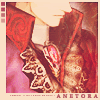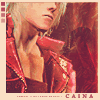Three subjected-based icons
These three icons are supposed to be seen together:



The first one, "Antenora" is of Sparda, the second, "Ptolomea" is of Virgil, and the last one, "Caina" is of Dante. I originally came up with this concept while I was looking for new local CDs at Kiss the Sky, I came across a band called "the Antenora". It was five bucks, funds went to the band, so I picked it up. Now the type of music they played wasn't as important as the name (even though the music rocks). I became curious as I was listening, and went to look up what "Antenora" meant. Dictionary.com didn't have it, nor did Wikipedia (which is odd), so I had to delve a little deeper. I finally found what I was looking for, and it turned out to be an interesting tidbit of information:
In Alighieri's Inferno, the ninth and lowest circle of Hell is known as Cocytus. It is a huge lake that is frozen by the constant flap of Lucifer's wings. Dante described it as being the home of traitors and those who committed acts of complex fraud in completely knowledge that they have done so. Lucifer, himself, is constantly devouring the three greatest traitors in history: Cassius, Brutus and Judas. They are being chewed in his three mouths.
The traitors that reside in Cocytus are broken into four categories.
Antenora after Antenor from the Iliad; traitors to country.
Ptolomea after Ptolemy, governor of Jericho, who murdered his guests (1 Maccabees); traitors to guests.
Caina after the Biblical Cain; traitors to blood relatives.
Judecca after Judas Iscariot; traitors to masters and benefactors.
Of course I've read Inferno before, but a lot of the terminology still goes over my head. It's a little hard to get everything at once when you read it. Now, to why I chose to represent each icon with each specific round:
Sparda This one's pretty simple. Sparda betrays his demonic blood by sealing off the demon world from the human world and taking pity on humans. Was it the right thing to do? Probably. Did he still betray the demons? Yes. If I was a demon, I'd probably despise him.
Virgil I had a hard time choosing between "Judecca" and "Ptolomea" for him. I ended up choosing "Ptolomea" because he's a traitor to Dante in the sense that he invites him to Temen-ni-Gru and then fucks him over pretty bad. I still don't see him as a traitor to the family (Caina) because what he did was still in Dante's best interest, and I don't think that thought ever left his mind.
Dante I can't see him as anything less then a betrayer to Virgil-which is odd, because he's the protagonist of the game series. He goes through DMC3 blindly following his brother, either to get revenge on him or demand attention from him. In the end, because of Dante's own inability to make the correct decision until the last minute, he loses Virgil. Virgil falls into Hell and becomes Nero Angelo. It's sort of cause and effect. While Dante didn't directly betray him, he did a lot of things that he could have done with better intention, and he wasn't there when Virgil needed him the most.
In the original, Dante doesn't know who Nero Angelo is until the end, and still ends up killing him. Could something else have been done about it? Probably. Again, this isn't a direct betrayl, but Dante doesn't seem to really understand the importance of family.
Anyway, that's it. All thoughts and comments are welcome. Votes for Virgil to be "Judecca" instead of "Ptolomea" and arguments for it are also welcomed.
The first one, "Antenora" is of Sparda, the second, "Ptolomea" is of Virgil, and the last one, "Caina" is of Dante. I originally came up with this concept while I was looking for new local CDs at Kiss the Sky, I came across a band called "the Antenora". It was five bucks, funds went to the band, so I picked it up. Now the type of music they played wasn't as important as the name (even though the music rocks). I became curious as I was listening, and went to look up what "Antenora" meant. Dictionary.com didn't have it, nor did Wikipedia (which is odd), so I had to delve a little deeper. I finally found what I was looking for, and it turned out to be an interesting tidbit of information:
In Alighieri's Inferno, the ninth and lowest circle of Hell is known as Cocytus. It is a huge lake that is frozen by the constant flap of Lucifer's wings. Dante described it as being the home of traitors and those who committed acts of complex fraud in completely knowledge that they have done so. Lucifer, himself, is constantly devouring the three greatest traitors in history: Cassius, Brutus and Judas. They are being chewed in his three mouths.
The traitors that reside in Cocytus are broken into four categories.
Antenora after Antenor from the Iliad; traitors to country.
Ptolomea after Ptolemy, governor of Jericho, who murdered his guests (1 Maccabees); traitors to guests.
Caina after the Biblical Cain; traitors to blood relatives.
Judecca after Judas Iscariot; traitors to masters and benefactors.
Of course I've read Inferno before, but a lot of the terminology still goes over my head. It's a little hard to get everything at once when you read it. Now, to why I chose to represent each icon with each specific round:
Sparda This one's pretty simple. Sparda betrays his demonic blood by sealing off the demon world from the human world and taking pity on humans. Was it the right thing to do? Probably. Did he still betray the demons? Yes. If I was a demon, I'd probably despise him.
Virgil I had a hard time choosing between "Judecca" and "Ptolomea" for him. I ended up choosing "Ptolomea" because he's a traitor to Dante in the sense that he invites him to Temen-ni-Gru and then fucks him over pretty bad. I still don't see him as a traitor to the family (Caina) because what he did was still in Dante's best interest, and I don't think that thought ever left his mind.
Dante I can't see him as anything less then a betrayer to Virgil-which is odd, because he's the protagonist of the game series. He goes through DMC3 blindly following his brother, either to get revenge on him or demand attention from him. In the end, because of Dante's own inability to make the correct decision until the last minute, he loses Virgil. Virgil falls into Hell and becomes Nero Angelo. It's sort of cause and effect. While Dante didn't directly betray him, he did a lot of things that he could have done with better intention, and he wasn't there when Virgil needed him the most.
In the original, Dante doesn't know who Nero Angelo is until the end, and still ends up killing him. Could something else have been done about it? Probably. Again, this isn't a direct betrayl, but Dante doesn't seem to really understand the importance of family.
Anyway, that's it. All thoughts and comments are welcome. Votes for Virgil to be "Judecca" instead of "Ptolomea" and arguments for it are also welcomed.